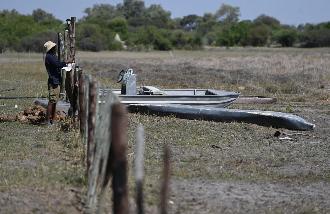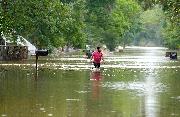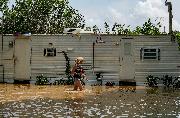
A tourist campsite operator hangs clothes on the fence where traditional boats are seen in a dry channel where they use to use boat near the Nxaraga village in the Okavango Delta on the outskirts of Maun on April 25, 2024. A drought across southern Africa has been driven mostly by the El Nino weather pattern, not climate change, scientists said. Zambia, Zimbabwe and Malawi have declared a national disaster over the severe dry spell that started in January and has devastated the agricultural sector, decimating crops and pastures. Scientists at the World Weather Attribution (WWA) research group found global warming had little to do with it. In a study focusing on Zimbabwe, Botswana, Zambia and Mozambique, researchers analysed historical weather data for the period from December to February -- the peak of the rainy season. They found rainfall has actually increased in the region as the planet warms. But effective precipitation has remained the same, likely because higher temperatures lead to more water evaporation, they said. On the other hand, El Nino, a recurring natural weather phenomenon, brought fewer showers, increasing the likelihood of severe droughts, the data showed. (Photo by Monirul Bhuiyan / AFP) (Photo by MONIRUL BHUIYAN/AFP via Getty Images)


